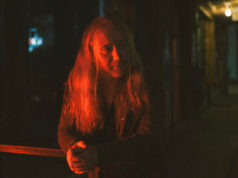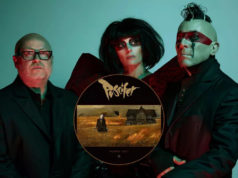The Toadies’ Play.Rock.Music
Let’s get this out of the way first. Play.Rock.Music, The Toadies’ fifth studio album since first forming in the late 1980s, doesn’t get off to a great start. The main problem: Leadoff track “Rattler’s Revival” doesn’t really sound like The Toadies. For one thing, frontman Vaden Todd Lewis isn’t himself. He seems to be playing some sort of character, swapping his unique supersonic but gritty Lou Gramm-ish tenor for a weird approximation of a TV evangelist’s twangy yelp mixed with a wisecracking David Byrne. The lyrics also are a little corny and seemingly born of little effort — the chorus consists of “Shake your tail / Shake it like a rattler / Can you feel it? / Shake it like a rattler / Let me see it / Shake it like a rattler / Come on, people / We’re almost there.” What exactly, in the context of a rock ’n’ roll song, could a rattler possibly refer to? And what is this “there” we people are almost getting to? If “Rattler’s Revival” is some sort of inside joke, then it works. Otherwise, meh. (The breakdown — a tiny guitar figure over clap-clap clap, clap-clap clap — is pretty choice, though.)
The good news is that The Toadies, arguably Fort Worth’s highest profile rock musical export, are on track throughout the rest of the album. Is Play.Rock.Music as good as Rubberneck? No, but is the new recording the best thing to come out of Camp Toadies since that ’94 major-label gem? Easily.
Released late last month by Dallas-based Kirtland Records, Play.Rock.Music is The Toadies’ first studio album since 2010, when the band released Feeler, a re-recording of material intended to follow Rubberneck in 1997 but rejected by the band’s label, Interscope Records. The Toadies’ first post-Rubberneck effort, Hell Below/Stars Above, came out in 2001, and their last studio album of new material, No Deliverance, was released in 2008. In other words, The Toadies have been off and on and on and off for a while now, but with Play.Rock.Music they seem to be finally capitalizing on their relatively newfound stability. The newest member, bassist Doni Blair, came on board in 2008. Clark Vogeler has been playing guitar since 1996 and Mark Reznicek drumming since ’91.
As expected, the musicianship and songwriting on Play.Rock.Music is super-tight. The singer’s lovelorn desperation in “Sunshine” is reflected in the slow-burning build-up toward the denouement, when Lewis comes on hot and heavy, summoning the same creepily sexy power that defined “Possum Kingdom,” the band’s groundbreaking ’94 hit. “Do you wanna die?!” “Sunshine” might not have any other choice. Another classic-Toadies tune is “Get Low,” all locomotive rhythms and crunchy guitars. The backbone is Blair’s pounding bass, the contrapuntal fuel to Lewis’ soaring refrain of “sweet pariah, sweet pariah.” “Beside You” is also pure Toadies. Not only is it eerily haunting — “Although I’m leaving / Wherever I go / I’ll always be closer than you know” — the song is also tautly arranged, progressing from a lullaby to a full-on shouter gradually and gracefully.
Besides “Rattler’s Revival,” the album’s only other false note is “Laments of a Good Man.” Each verse is structured as a weird sort of call-and-response between the singer and what appears to be a choir of bratty children, and the countrified ping-ponging guitars and rhythms seem a little silly. The story the song tells, though, is anything but frivolous. It’s actually a pretty stinging, really darkly poetic indictment of the dysfunction inherent in nuclear-family life. Even people not in serious relationships can relate: “So you take the children to the mall and send them on their way / You can say it buys you freedom, but you know you’re going to pay / When they get home they turn around / They’re off to see their friends / And they’ll smoke some pot and god knows what until the party ends.”
The song ends, appropriately, on a note of frightening optimism. The singer returns from a day on the links with his friends to find a note from his wife: “ ‘You’re never home / I’m so alone / I’m taking everything’ / You start to tremble, then the tears / ‘I haven’t felt alive in years’ / You think your life is over, but it’s really starting here.”
And The Toadies start over. Again. –– Anthony Mariani
Great Recession Orchestra’s Double Shot
If you demand angst in your country music, don’t give two thoughts to Double Shot. Heartbreak never felt so joyous as in the gifted hands of the mostly Fort Worth-based Great Recession Orchestra. On its sophomore album, the band offers an angst-free celebration of vintage tunes. Nearly all 19 songs involve personal loss of some sort, and yet the band zips through the tracks with a playful zest that can’t help but make the listener smile. Piano, fiddle, dobro, and pedal steel intertwine with guitar, bass, and drums in the hillbilly jazz tradition of Milton Brown and Bob Wills, with silly lyrics sprinkled amid upbeat renditions. A philandering woman on “Boogie Baby” has the forsaken singer wondering good-naturedly, “Can she wiggy? / Can she waggy? / I’m asking you, by cracky / Have you seen my boogie baby down your way?”
Damon Gray and Michael Holleman handle the bulk of the vocals in the smooth, jaunty style made famous by Western Swing singers such as Tommy Duncan. Elsewhere, Maryann Price’s cool-jazz vocals highlight the handful of songs she tackles. Price’s voice is familiar to fans of Dan Hicks and His Hot Licks and Asleep at the Wheel, and she’s as good as ever here. Double Shot’s abundant songs are divided into two categories: “The Forties in Fort Worth,” featuring World War II-era songs found on Cowtown radio back then, and “Shaking the Sheiks,” featuring the pioneering tunes of the Mississippi Sheiks circa the 1930s (the band that introduced “Sitting on Top of the World”).
GRO’s album is infused with a local feel, including guitar and vocal work by Cowtown bad-ass Buddy Whittington, dobro and steel by Ray Austin, fiddle by JD Smith, and drumming by Davy Crockett. The album showcases hot picking by talented musicians who are obviously having a good time, but the fun wears a bit thin by the end –– 19 songs might be too much for one sitting. Then again, too much of a good thing is hardly a criticism. Double Shot is a solid and worthy effort by veteran musicians honoring a traditional form of swing music with deep roots in Cowtown. –– Jeff Prince












After seeing your article I gave the album a quick listen, although I have to admit I don’t recall the last time I heard Toadies when someone wasn’t drunk, singing a Karaoke version of Possum Kingdom. I didn’t pay much attention to the lyrics, just judged it on its sound and feel. Your spot on with Rattler’s Revival and Laments of a Good Man; I’d also add Epic Castles to that list. I loved the build on Sunshine (even reminded me a bit of Live) and thought Animals had a good sound. Bottom line – I wouldn’t tell someone to turn it off, but I probably won’t be putting the album on shuffle again for a bit.
All good points, Tony. Thanks for writing them. And there’s something I’d also add: To me, the best songs are, well, the heavier songs.
I’ll take your David Byrne on ‘Rattler’ and raise you a Stan Ridgeway …
Agreed, mountainmoova. Much better reference.